
MAGNESIUM RESEARCH
metrics 2024
Advancing Knowledge on Magnesium in Health and Disease
Introduction
MAGNESIUM RESEARCH, published by John Libbey Eurotext Ltd, is a leading journal in the fields of biochemistry, clinical biochemistry, and molecular biology, dedicated to advancing the understanding of magnesium's role in biological systems. With an ISSN of 0953-1424 and an E-ISSN of 1952-4021, this journal has been a vital resource for researchers and professionals since its inception in 1988, now converging into its 2024 issues. Positioned in the Q4 category for 2023 across several biochemistry domains, the journal is indexed in Scopus, providing a significant platform for the dissemination of research findings. Despite its current rankings reflecting a need for further impact, the journal serves as an important venue for emerging research that explores the biochemical and metabolic functions of magnesium, underlining its crucial influence on health and disease. Although primarily published using traditional access models, the content remains relevant for those seeking to deepen their knowledge in this essential mineral’s biological importance. Researchers, students, and professionals in related fields will find MAGNESIUM RESEARCH an invaluable addition to their academic resources.
Metrics 2024
 0.29
0.29 1.50
1.50 1.60
1.60 53
53Metrics History
Rank 2024
Scopus
IF (Web Of Science)
JCI (Web Of Science)
Quartile History
Similar Journals

JOURNAL OF NUTRITIONAL SCIENCE AND VITAMINOLOGY
Fostering Knowledge in Nutritional Science for AllJOURNAL OF NUTRITIONAL SCIENCE AND VITAMINOLOGY, published by the CENTER ACADEMIC PUBL JAPAN, serves as a vital platform for scientific inquiry into the fields of nutrition and vitaminology. Established in 1973, this peer-reviewed journal not only focuses on the biochemical aspects of nutrition but also addresses broader implications on health and disease prevention. With an ISSN of 0301-4800 and an E-ISSN of 1881-7742, it provides researchers, health professionals, and students access to novel studies and reviews that advance understanding in nutritional science. Though currently not an open access journal, it maintains a respectable position in academia, with a 2023 Quartile Q3 ranking in both Medicine (miscellaneous) and Nutrition and Dietetics, and Scopus rankings reflecting its growing influence. As the journal converges towards 2024, it remains committed to enlightening its audience on the latest research developments and fostering discourse within this essential scientific community.

CRITICAL REVIEWS IN BIOCHEMISTRY AND MOLECULAR BIOLOGY
Charting New Pathways in Biochemical SciencesWelcome to Critical Reviews in Biochemistry and Molecular Biology, a premier academic journal published by Taylor & Francis Ltd, dedicated to advancing the fields of biochemistry and molecular biology. With an impressive impact factor and a Q1 ranking in both Biochemistry and Molecular Biology for 2023, this journal serves as a vital resource for researchers, professionals, and students eager to engage with cutting-edge reviews and analyses that synthesize the latest developments in these dynamic areas of study. Since its inception in 1972, the journal has maintained a commitment to high-quality scholarship, providing a platform for critical discussions that accelerate the discovery and understanding of biochemical processes and molecular interactions. Although not open access, its robust editorial peer-review process ensures that published articles meet the highest standards of scientific rigor, making it a trusted source for the scientific community. As we continue to converge toward 2024, we invite you to explore the extensive array of topics and findings that have shaped contemporary biochemistry and molecular biology.
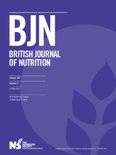
BRITISH JOURNAL OF NUTRITION
Unveiling the Science Behind NutritionThe British Journal of Nutrition, a premier publication in the field of nutrition and dietetics, is brought to you by Cambridge University Press. Established in 1947, this journal has consistently provided a platform for groundbreaking research and innovation in the domain of nutrition, boasting an impressive converged timeline extending to 2024. Recognized for its high academic standards, it proudly holds a Q1 ranking in Medicine (miscellaneous) and a Q2 ranking in Nutrition and Dietetics as of 2023, reflecting its impact and relevance in the scientific community. With a Scopus rank of 75 out of 398 in Medicine and 38 out of 140 in Nutrition and Dietetics, the journal remains a vital resource for researchers, professionals, and students seeking to enhance their knowledge and understanding of nutritional science. While the journal is not open access, it offers a wealth of valuable insights, making it an essential addition to any academic collection focused on health and nutrition.
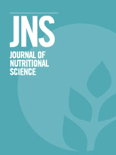
Journal of Nutritional Science
Innovating dietary research for impactful health solutions.The Journal of Nutritional Science, published by Cambridge University Press, is a leading open-access journal dedicated to the field of nutrition and dietary research. Established in 2012, this journal aims to disseminate high-quality research on nutrition, dietetics, and their implications for health and disease. With an impact factor reflective of its growing importance—holding Q2 and Q3 rankings in relevant categories such as Nutrition and Dietetics and Endocrinology—the journal serves as a vital platform for researchers, professionals, and students interested in evidence-based advancements within the nutritional sciences. The Journal of Nutritional Science is based in the United Kingdom and leverages a global network of experts to foster discussions that drive innovation in food science and health policies. By enabling open access to its content, it ensures that critical knowledge is readily available to the academic community and beyond, promoting a healthier, more informed society.
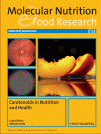
MOLECULAR NUTRITION & FOOD RESEARCH
Transforming Nutritional Insights into Practical Solutions.MOLECULAR NUTRITION & FOOD RESEARCH, published by Wiley, is a premier journal dedicated to the rapidly evolving field of food science and nutrition. With an impressive impact factor and a consistent position in the Q1 category for both Biotechnology and Food Science in 2023, this journal stands out as a leading platform for researchers, professionals, and students alike. The scope encompasses a comprehensive range of topics from molecular nutrition to innovative food research, with a focus on translating scientific insights into practical applications that enhance human health. As part of its commitment to accessibility, the journal offers open access options, allowing for wider dissemination and engagement with the academic community. Given its high ranking in Scopus—placing 42nd in Food Science and 62nd in Biotechnology—the journal plays a critical role in advancing knowledge and fostering collaboration in these essential fields. For over two decades, it has provided a vital forum for cutting-edge research, ensuring that each issue contributes significantly to the discourse around food and nutrition.
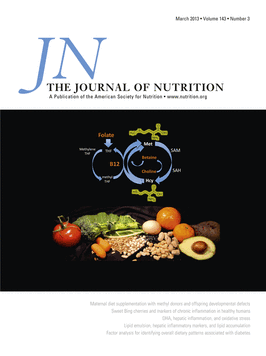
JOURNAL OF NUTRITION
Cutting-edge research bridging nutrition and health.JOURNAL OF NUTRITION is a premier academic journal published by Elsevier Science Inc, dedicated to advancing the understanding of nutritional science and its impact on health. With a long-standing tradition since its inception in 1945, the journal provides a vital platform for high-quality research, featuring articles that cover a wide range of topics within the fields of Medicine and Nutrition and Dietetics. Recognized for its significant contributions, the journal holds an impressive impact factor, with a Q1 rank in both Medicine (miscellaneous) and Nutrition and Dietetics as of 2023, positioning it among the top tier of scholarly publications in these disciplines. The Scopus Rankings further validate its status, boasting a rank of #57/398 in Medicine and #30/140 in Nutrition, indicating its influential presence in the research community. Although it operates under a traditional access model, the journal actively engages with a global audience of researchers, professionals, and students by disseminating cutting-edge insights designed to inform nutrition policy and practice. By focusing on current trends, innovative methodologies, and evidence-based nutrition strategies, the JOURNAL OF NUTRITION continues to be an essential resource for those committed to enhancing health through nutrition.
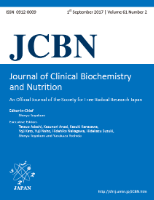
JOURNAL OF CLINICAL BIOCHEMISTRY AND NUTRITION
Bridging Biochemical Research and Nutritional PracticesJOURNAL OF CLINICAL BIOCHEMISTRY AND NUTRITION is a premier publication dedicated to the advancements in the fields of clinical biochemistry, nutrition, and dietary sciences. Published by the esteemed JOURNAL CLINICAL BIOCHEMISTRY & NUTRITION in Japan, this journal serves as a crucial platform for researchers and professionals to disseminate their findings and insights. With an ISSN of 0912-0009 and an E-ISSN of 1880-5086, it features a broad spectrum of original research articles, reviews, and case studies, fostering a deeper understanding of the interplay between biochemical processes and nutritional science. Notably, the journal has achieved significant rankings, placed in the Q3 and Q2 quartiles across various relevant categories, indicating its rising impact and relevance within the scientific community. Researchers will benefit from its rich repository of knowledge, while students and professionals will find it an invaluable resource for staying updated with the latest developments. Access options are available for interested readers, further contributing to the journal's objective of promoting open dialogue and research in clinical biochemistry and nutrition.
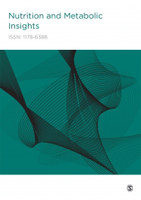
Nutrition and Metabolic Insights
Exploring the intersection of diet and health.Nutrition and Metabolic Insights is a distinguished open-access journal published by SAGE Publications Ltd, dedicated to advancing the fields of nutrition, metabolic processes, and dietary sciences. Since its inception in 2008, this journal has carved a niche for itself within the academic community, offering a platform for rigorous research and innovative findings. With a focus on multidisciplinary approaches, it publishes articles that explore vital aspects of Endocrinology, Diabetes and Metabolism, Food Science, and Nutrition and Dietetics, earning recognition with a 2023 Q2 ranking in Food Science and Q3 rankings in other critical categories. Researchers and professionals can access cutting-edge research that not only contributes to academic discourse but also informs clinical practice and public health discussions. By facilitating the dissemination of knowledge, Nutrition and Metabolic Insights plays a crucial role in improving health outcomes worldwide, making it an essential resource for students, researchers, and health professionals alike.

Journal fur Mineralstoffwechsel & Muskuloskelettale Erkrankungen
Unlocking the Secrets of Mineral Metabolism for Better HealthJournal fur Mineralstoffwechsel & Muskuloskelettale Erkrankungen, published by SPRINGER WIEN, stands at the forefront of research in mineral metabolism and musculoskeletal disorders. With an ISSN of 2412-8260 and an E-ISSN of 2412-8287, this Open Access journal has been dedicated to disseminating high-quality research since its inception in 2001, providing an invaluable platform for scholars, clinicians, and students alike. Located in the vibrant academic hub of Vienna, Austria, the journal facilitates the exploration of innovative approaches to understanding the intricate relationship between mineral balance and musculoskeletal health. By ensuring that all articles are freely accessible, it fosters collaboration across disciplines and encourages the translation of research findings into clinical practice. The journal is essential for professionals committed to advancing knowledge in this crucial field, making it a key reference point for those engaged in the study and treatment of mineral and musculoskeletal disorders.

EUROPEAN JOURNAL OF NUTRITION
Fostering Knowledge for a Nutritionally Informed WorldEuropean Journal of Nutrition, published by Springer Heidelberg, is a premier outlet for groundbreaking research in the field of nutrition and dietetics. Established in 1996 and set to continue its impactful legacy until at least 2024, this journal enjoys an impressive recognition, holding a Q1 category rank in both Medicine (miscellaneous) and Nutrition and Dietetics, with notable Scopus rankings that place it in the top 10% of its field. The journal facilitates open access options, enhancing the dissemination of knowledge across the globe. It serves as a vital platform for researchers, healthcare professionals, and students, promoting the exchange of innovative ideas and advancements in nutritional science that aim to improve health outcomes worldwide. With a commitment to quality and relevance, the European Journal of Nutrition continues to shape the future of nutrition research and practice.